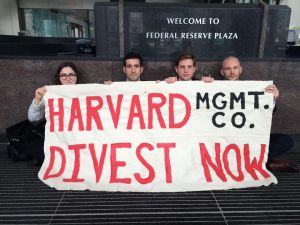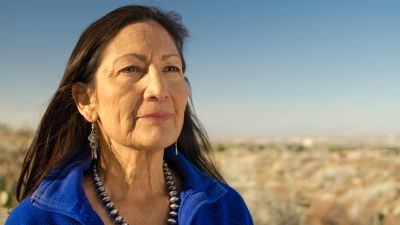
German astronaut Alexander Gerst took this image of the Earth aboard the International Space Station (Photo: Alexander Gerst / ESA via Getty Images)
This Earth Day, take risks so your children don’t have to.
The world is finally waking up to the reality of climate change. Last year in Paris, nations at last agreed to limit warming to two degrees Celsius – and one and a half degrees if possible. After decades of equivocation, the world has formally announced its aspiration to fix the climate problem.
Such aspirations are not equivalent to action. Yet they set the stage for action. And that is where we all have a part to play.
Last week in Boston, students and alumni of Harvard converged on the offices of the Harvard Management Company to protest its continued investments in fossil fuels. As dozens demonstrated outside, four of us entered the building – the same skyscraper that houses the Boston branch of the Federal Reserve Bank – and sat in the lobby with a banner reading “Harvard Management Company: Divest Now.” We intended to stay, peacefully and silently, until the end of the day or until we were forcibly removed. Two hours later, we were led in handcuffs to a jail in Boston.
As I sat in my cell, I wondered if our act of disobedience would produce something useful, something of value. Six hours and $40 later, I was out on bail, and a court date looms next month. Time will tell if it had an impact, but even if it doesn’t, to me it’s still worth it.
Why? The task before us now is not just to make soaring speeches about climate change. It is to move the world, bit by bit and piece by piece, to change in the ways that are necessary to align rhetoric and action.
The world has agreed to limit warming. The Intergovernmental Panel on Climate Change tells us that to accomplish this, the world needs to draw down investments in fossil fuel extraction by some $100 billion per year for the next two decades – yet Harvard refuses, University President Drew Faust arguing against the need. Peer-reviewed research tells us that honoring the Paris agreement renders continued fossil fuel exploration and development unnecessary (and thus counterproductive) – yet Harvard continues to invest in these, even as a private equity anchor investor in struggling oil and gas companies.

Harvard students staged a sit-in in the building where the university’s $37 billion endowment is managed to call for divestment of fossil fuel. (Photo: Divest Harvard)
If the totality of Harvard’s $37.6 billion endowment is invested similarly to the small portion reported to the public, then Harvard may have more than a billion dollars invested in fossil fuels. Our president at Harvard makes plenty of speeches on climate, but today we need more than speeches; we need actions in alignment with words.
And so we found ourselves sitting in the lobby of the Boston Federal Reserve building, bringing our message to the Harvard Management Company, which ignores the future for short-term gain. When Harvard lauds the agreement in Paris while investing in the activities that undermine it, the agreement is betrayed; the youth of the world are betrayed; the old who care for posterity are betrayed. And the cities of Boston and Cambridge, home to Harvard, its students and employees, which may be destroyed by rising seas, are betrayed as well. The world should know of this, and Harvard’s administrators should know that students will not be deterred from calling this betrayal by its proper name, protesting it even when doing so means arrest.
To carry a criminal record carries some degree of risk. And we must also live with the fact that the impact of our actions cannot always be known before we carry them out. Yet such risks are nothing compared to those that we force onto others through inaction. When we avoid risks today for the sake of comfort, nothing is gained in the end; we merely force more risk onto our children tomorrow. There is value in refusing to live in such a way, and the young, with ideals intact, recognize this. The same week we were arrested for protesting Harvard’s fossil fuel investments, more than 30 students at the University of Massachusetts Amherst were arrested for protesting their university’s fossil fuel investments. And this week, students at Columbia and NYU have staged sit-ins to call their leaders to account. These students willingly accept extra risk today because their elders deferred doing so yesterday.
Living in alignment with our ideals has value; it slowly banishes fear and makes new realities possible. On this Earth Day, we can resolve to align our actions with our aspirations, even if it means facing extra risks (or a day in jail). And so the world may be moved, bit by bit, piece by piece, to change in the ways we need.




